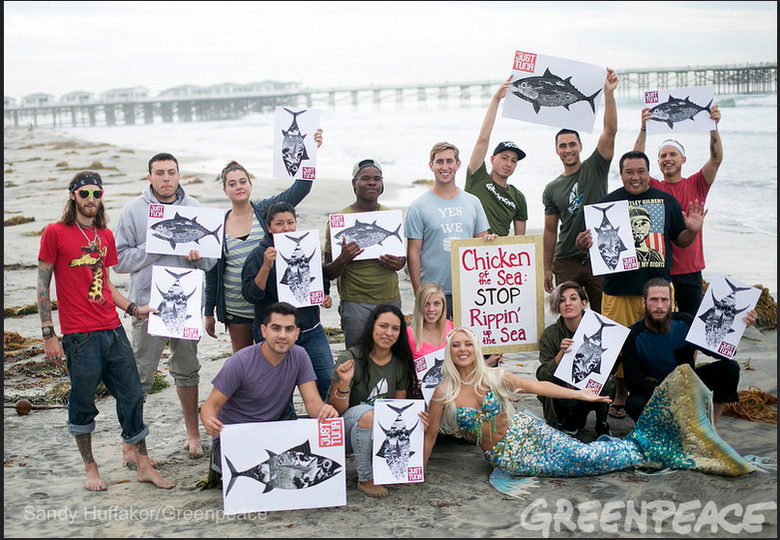Changing The Tuna Industry For The Ocean And Fishermen At Sea
The global tuna industry is out of control. Many of the biggest companies use fishing methods that deplete our ocean of fish and unnecessarily kill sharks, turtles and seabirds in the process. The tuna industry has also been repeatedly implicated in human rights abuses and forced labor. Recent investigations reveal incidents of inadequate or nonexistent pay, beatings, food and sleep deprivation, and even allegations of murder at sea. We must change the tuna industry, and fast.
The Daily Meal recently featured a series by Lauren Reid, a food blogger from New Orleans who joined Greenpeace on its Rainbow Warrior ship as it monitored Pacific tuna fisheries. Lauren and the Greenpeace team boarded tuna vessels with their permission to witness the working conditions and impacts of tuna fishing on marine life. Unfortunately, even the better run tuna vessels had unacceptable conditions. On one boat, workers were forced to relieve themselves over the edge of the boat and on another workers were fined for drinking clean water. On many of the boats conditions were poor and fishermen worked extremely long hours. The team even discovered a Taiwanese vessel that was fishing illegally and carrying illegal shark fins. It's time for the tuna industry to clean up its act.
Earlier this month, Greenpeace launched a global campaign against the owner of Chicken of the Sea and largest canned tuna company in the world, Thai Union Group. Recent New York Times and Associated Press investigations have connected the company to serious human rights abuses and forced labor scandals at sea. In fact, just last month a lawsuit was filed accusing Chicken of the Sea and Thai Union of selling products caught via forced labor. These companies also use fishing methods known for ocean destruction and high levels of bycatch — or the unintentional capture of nontarget species during fishing. It's clear that consumers can't feel confident in purchasing a Thai Union-owned brand until it makes serious changes.
This week, we took that message to Chicken of the Sea's doorstep in San Diego — literally. At the company's headquarters, acclaimed mermaid performance artist and ocean activist Hannah Fraser joined Greenpeace to deliver a strong message on sustainability. Wearing her mermaid tail, Fraser used a megaphone to demand a response from the company's CEO and delivered 83,247 petitions from concerned customers and activists across the country. This was part of a series of protests around the globe urging Thai Union and its brands to embrace more sustainable fishing methods and ensure their supply chains are free of human rights abuses.
Though the protest in San Diego has concluded, the campaign to change Thai Union has just begun. In fact, next week three billboards crowdfunded by supporters will go up in San Diego urging Chicken of the Sea to "stop rippin' up the sea," including one directly across from company headquarters.
Fortunately, consumers do have options for more sustainable tuna. Wild Planet, American Tuna and Ocean Naturals all use fishing methods that are better for our ocean and marine life, ranking at the top of a recent Greenpeace canned tuna guide. These options are widely available at grocery stores across the country and choosing one of them sends a direct message to big tuna to clean up its act. We have the power to vote with our dollars for more sustainable options.
Chicken of the Sea and Thai Union have done their best to greenwash their brands, using a mermaid logo to appeal to families and putting forth the bare minimum commitments on sustainability and human rights. As consumers around the world learn that the tuna industry is devastating the ocean and jeopardizing the lives of its workers, this bare minimum is no longer enough. It's time to change the industry, and that starts with Chicken of the Sea and Thai Union making major changes to their supply chains.

